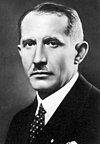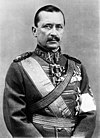User:Sandoria/Sandbox7: Difference between revisions
Jump to navigation
Jump to search
| (175 intermediate revisions by the same user not shown) | |||
| Line 1: | Line 1: | ||
{{ | ==First Citizen of the Miersan Revolutionary Republic== | ||
[[File: | {| class="wikitable" style="text-align:center; width:60%; | ||
|- | |||
== | !align="center" colspan=4|First Citizen | ||
=== | !align="center"|Term of office | ||
[[File: | !align="center"|Party | ||
|- | |||
|'''1''' | |||
|style="background:red"| | |||
|[[File:Danilo Petrović Njegoš.jpg|100px]] | |||
|<big>'''[[Marceli Tyburski]]'''</big><br>1783{{ndash}}<br>1861 | |||
|1856 <br>{{ndash}}<br>1857 | |||
|[[Supreme Miersan Council]] | |||
|} | |||
==Governor of Miersa== | |||
{| class="wikitable" style="text-align:center; width:60%; | |||
|- | |||
!align="center" colspan=4|Governor | |||
!align="center"|Term of office | |||
!align="center"|Party | |||
|- | |||
|'''1''' | |||
|style="background:green"| | |||
|[[File:Šupljikac von Vitez, Stefan (1789 - 1848).jpg|100px]] | |||
|<big>'''[[Krystian Grochowski]]'''</big><br>1786{{ndash}}<br>1963 | |||
|1857 <br>{{ndash}}<br>1863 | |||
|[[Miersan Sobor]] | |||
|- | |||
|'''2''' | |||
|style="background:silver"| | |||
|[[File:Andrássy Gyula foto.jpg|100px]] | |||
|<big>'''[[Wladyslaw Urbanowicz]]'''</big><br>1820{{ndash}}<br>1890 | |||
|1863 <br>{{ndash}}<br>1875 | |||
|Independent | |||
|- | |||
|'''3''' | |||
|style="background:silver"| | |||
|[[File:Valuyev.jpg|100px]] | |||
|<big>'''[[Stanislaw Lagow]]'''</big><br>1815{{ndash}}<br>1894 | |||
|1785 <br>{{ndash}}<br>1880 | |||
|Independent | |||
|- | |||
|'''4''' | |||
|style="background:silver"| | |||
|[[File:Gurko IV.jpg|100px]] | |||
|<big>'''[[Artim Torysky]]*'''</big><br>1827{{ndash}}<br>1900 | |||
|1880 <br>{{ndash}}<br>1896 | |||
|Independent | |||
|- | |||
|'''5''' | |||
|style="background:silver"| | |||
|[[File:IonelBratianu3b40761r.jpg|100px]] | |||
|<big>'''[[Dawid Walczak]]'''</big><br>1865{{ndash}}<br>1927 | |||
|1896 <br>{{ndash}}<br>1915 | |||
|Independent | |||
|- | |||
|'''6''' | |||
|style="background:silver"| | |||
|[[File:Petrovskiy GI Soc Kiev 1937 01 p10bis.jpg|100px]] | |||
|<big>'''[[Egyed Henrik]]**'''</big><br>1876{{ndash}}<br>1957 | |||
|1915 <br>{{ndash}}<br>1922 | |||
|Independent | |||
|- | |||
|'''7''' | |||
|style="background:gold"| | |||
|[[File:Konstantin Päts.jpg|100px]] | |||
|<big>'''[[Imrich Litmanov]]*'''</big><br>1874{{ndash}}<br>1955 | |||
|1922 <br>{{ndash}}<br>1934 | |||
|[[Soravian Nationalist Party]] | |||
|- | |||
| colspan=6 | * denotes Governors of Soravian descent, ** denotes Governors of Savader descent | |||
|} | |||
==State Elder of the Miersan State== | |||
{| class="wikitable" style="text-align:center; width:60%; | |||
|- | |||
!align="center" colspan=4|Governor | |||
!align="center"|Term of office | |||
!align="center"|Party | |||
|- | |||
|'''1''' | |||
|style="background:#A0830E"| | |||
|[[File:Yevgen Konovalec.jpg|100px]] | |||
|<big>'''[[Oskar Raczkowski]]'''</big><br>1891{{ndash}}<br>1934 | |||
|1931 <br>{{ndash}}<br>1834 | |||
|[[Miersan Military Organisation]] | |||
|- | |||
| colspan=6 | The Miersan State was a puppet state of the Entente in the Great War | |||
|} | |||
==President of the Miersan Republic== | |||
{| class="wikitable" style="text-align:center; width:60%; | |||
|- | |||
!align="center" colspan=4|President | |||
!align="center"|Term of office | |||
!align="center"|Party | |||
= | |||
|- | |- | ||
|'''1''' | |||
|style="background:silver"| | |||
|[[File:Mannerheim1940.jpg|100px]] | |||
|<big>'''[[Pawel Michalowski]]'''</big><br>1867{{ndash}}<br>1950 | |||
|1935 <br>{{ndash}}<br>1950 | |||
|Independent | |||
|- | |- | ||
|'''2''' | |||
| [[ | |style="background:#2BD861"| | ||
|[[File:J.K. Paasikivi 1945 portrait (cropped).jpg|100px]] | |||
|<big>'''[[Emil Wojnicz]]'''</big><br>1870{{ndash}}<br>1959 | |||
|1950 <br>{{ndash}}<br>1959 | |||
|[[Republika (West Miersa)|Republika]] | |||
|- | |- | ||
|'''3''' | |||
| [[ | |style="background:#2BD861"| | ||
|[[File:Urho-Kekkonen-1975 (cropped).jpg|100px]] | |||
|<big>'''[[Konstanty Bartko]]'''</big><br>1900{{ndash}}<br>1985 | |||
|1959 <br>{{ndash}}<br>1980 | |||
|[[Republika (West Miersa)|Republika]] | |||
|- | |- | ||
|'''4''' | |||
| [[ | |style="background:#2BD861"| | ||
|[[File:Kalevi-Sorsa-1975 (cropped).jpg|100px]] | |||
|<big>'''[[Sylwester Petroski]]'''</big><br>1930{{ndash}}<br>2001 | |||
|1980 <br>{{ndash}}<br>1982 | |||
|[[Republika (West Miersa)|Republika]] | |||
|- | |- | ||
|'''5''' | |||
| [[ | |style="background:#1B4107"| | ||
|[[File:Борис Николаевич Ельцин-1 (cropped) (cropped).jpg|100px]] | |||
|<big>'''[[Kazimierz Glogowski]]'''</big><br>1931{{ndash}}<br>2006 | |||
|1982 <br>{{ndash}}<br>2004 | |||
|Independent (1982-1989)<br>[[Zobowiazanie]] (1989-2004 | |||
|- | |- | ||
|'''6''' | |||
| [[ | |style="background:#1B4107"| | ||
|[[File:Dmitry Medvedev official large photo -1 (cropped).jpg|100px]] | |||
|<big>'''[[Tomasz Kopernik]]'''</big><br>1964{{ndash}} | |||
|2004 <br>{{ndash}}<br>2014 | |||
|[[Zobowiazanie]] | |||
|- | |- | ||
|'''7''' | |||
| [[ | |style="background:#1B4107"| | ||
|[[File:Open Balkan 29 07 2021 (cropped).jpg|100px]] | |||
|<big>'''[[Jakub Lewkowicz]]'''</big><br>1970{{ndash}} | |||
|2014 <br>{{ndash}}<br> | |||
|[[Zobowiazanie]] | |||
|- | |- | ||
Latest revision as of 18:17, 19 December 2023
First Citizen of the Miersan Revolutionary Republic
| First Citizen | Term of office | Party | |||
|---|---|---|---|---|---|
| 1 | 
|
Marceli Tyburski 1783– 1861 |
1856 – 1857 |
Supreme Miersan Council | |
Governor of Miersa
| Governor | Term of office | Party | |||
|---|---|---|---|---|---|
| 1 | 
|
Krystian Grochowski 1786– 1963 |
1857 – 1863 |
Miersan Sobor | |
| 2 | 
|
Wladyslaw Urbanowicz 1820– 1890 |
1863 – 1875 |
Independent | |
| 3 | 
|
Stanislaw Lagow 1815– 1894 |
1785 – 1880 |
Independent | |
| 4 | 
|
Artim Torysky* 1827– 1900 |
1880 – 1896 |
Independent | |
| 5 | 
|
Dawid Walczak 1865– 1927 |
1896 – 1915 |
Independent | |
| 6 | 
|
Egyed Henrik** 1876– 1957 |
1915 – 1922 |
Independent | |
| 7 | 
|
Imrich Litmanov* 1874– 1955 |
1922 – 1934 |
Soravian Nationalist Party | |
| * denotes Governors of Soravian descent, ** denotes Governors of Savader descent | |||||
State Elder of the Miersan State
| Governor | Term of office | Party | |||
|---|---|---|---|---|---|
| 1 | 
|
Oskar Raczkowski 1891– 1934 |
1931 – 1834 |
Miersan Military Organisation | |
| The Miersan State was a puppet state of the Entente in the Great War | |||||
President of the Miersan Republic
| President | Term of office | Party | |||
|---|---|---|---|---|---|
| 1 | 
|
Pawel Michalowski 1867– 1950 |
1935 – 1950 |
Independent | |
| 2 | 
|
Emil Wojnicz 1870– 1959 |
1950 – 1959 |
Republika | |
| 3 | 
|
Konstanty Bartko 1900– 1985 |
1959 – 1980 |
Republika | |
| 4 | 
|
Sylwester Petroski 1930– 2001 |
1980 – 1982 |
Republika | |
| 5 | 
|
Kazimierz Glogowski 1931– 2006 |
1982 – 2004 |
Independent (1982-1989) Zobowiazanie (1989-2004 | |
| 6 | 
|
Tomasz Kopernik 1964– |
2004 – 2014 |
Zobowiazanie | |
| 7 | 
|
Jakub Lewkowicz 1970– |
2014 – |
Zobowiazanie | |